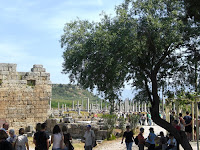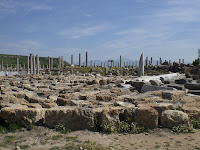



 We took a half day tour to the ancient city of Perge (hard g, Per-gay) and the then on to the ancient theatre of Aspendos (more on that later). Perge was only recently excavated and the excavation is ongoing. It appears that Government money is not readily available for this kind of work in Turkey so funding for the digs are periodically thrown at the archeologists which helps them for a while and then they need to wait for the next round of funding before they can do more. However, notwithstanding that, they have excavated some wonderful ruins at Perge. It was once a rich city and flourished in ancient times, about 200BC, we know that much, and was pagan in its belief. When Mary fled her carpenter son's death in 33AD, it is rumoured that she stayed in Perge and along with John (to whom Jesus said when he was dying, "She is your mother, he is your son") they came here to try and convert the persky pagans from their Greek and Roman mythology and their repeated idolisation of various fantastical Gods. It didn't work. The Christians didn't win Perge over until about 300 years later.
We took a half day tour to the ancient city of Perge (hard g, Per-gay) and the then on to the ancient theatre of Aspendos (more on that later). Perge was only recently excavated and the excavation is ongoing. It appears that Government money is not readily available for this kind of work in Turkey so funding for the digs are periodically thrown at the archeologists which helps them for a while and then they need to wait for the next round of funding before they can do more. However, notwithstanding that, they have excavated some wonderful ruins at Perge. It was once a rich city and flourished in ancient times, about 200BC, we know that much, and was pagan in its belief. When Mary fled her carpenter son's death in 33AD, it is rumoured that she stayed in Perge and along with John (to whom Jesus said when he was dying, "She is your mother, he is your son") they came here to try and convert the persky pagans from their Greek and Roman mythology and their repeated idolisation of various fantastical Gods. It didn't work. The Christians didn't win Perge over until about 300 years later.Back to Perge. Our tour guide took us round the site, pointing out the large town square where the slaves were bought and sold (incidentally, the busiest part of any market at this time); the individual market shops, complete with carved signs - we saw a butcher's shop carved out in marble; the exercise yard, the fountain and the Hammam. The Turkish Bath (Hammam) was separated into the hot room, the lukewarm room and the cold room. It would have been a wonderful experience. Steaming it up in an enormous marble sauna (we got to see the central heating system that allowed the steam to move around the room), lying and being scraped and pummelled in the massage room and then going for a cold dip in the pool. These rooms were reserved for those rich enough to afford it; they even had glass windows and were all marble. Just exquisite. Of course when we saw it, it was a bunch of ruins and you have to use your imagination, but the basis of what it was is still there.
It's easy to be in AWE of the Romans and the Greeks (particularly the Romans). They were so good at building and inventing all sorts of things to suit their needs. Their existence is of course tinged with sadness. It's not nice to have the busiest part of your market being the trade of slaves and when our guide showed us the sauna room and showed us the low ceilinged cellars where the stoking fires were kept, it was terribly upsetting to know that these were maintained and powered by slave children whose lungs very quickly gave out from working in such terrible conditions. They simply replaced them as and when it was necessary.
As I said, Perge was an affluent city. It was peppered, maybe littered is a good verb, with statues of Greek and Roman Gods. These were not at the excavation site. They had been carefully removed and transported to the local Antalya Archaeological Museum [when we booked this holiday, this was the one thing that I wanted to do. I had read that it was one of the best museums in Turkey].
We were shown the public areas of Perge; the residential areas hadn't been fully excavated yet, neither had some of the public sections. It was fascintaing though. And Jason and I both agreed that the site would have been a wonderful place for some outdoor theatre.
No comments:
Post a Comment